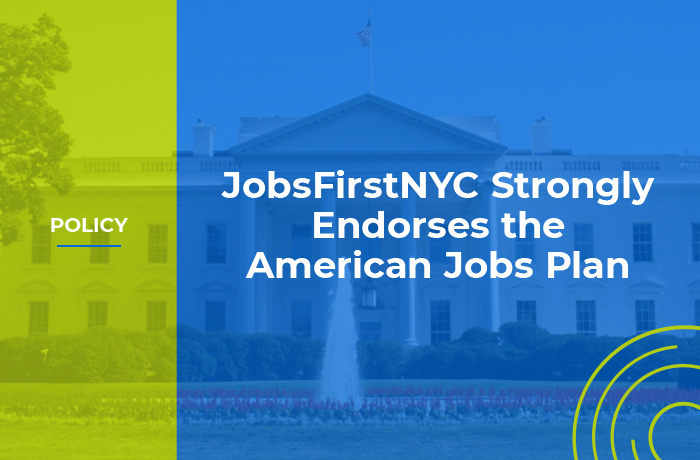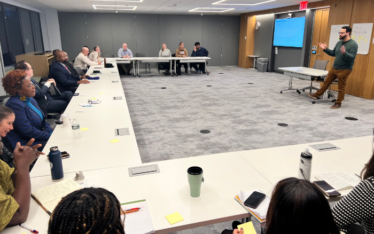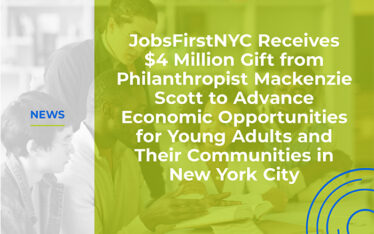On Wednesday, March 31, 2021, President Biden unveiled his American Jobs Plan, a $2 trillion investment in physical and social infrastructure improvements, including a $100 billion investment in workforce development. The ambitious, historic plan prioritizes investments in the green economy and in racial equity initiatives, while encouraging unionization and collective bargaining to ensure that the jobs created are good quality jobs. It will be funded through the Made in America Tax Plan, which will close corporate tax loopholes and require that infrastructure improvements are made using goods manufactured in the United States and shipped on U.S.-flagged vessels.
JobsFirstNYC strongly endorses the American Jobs Plan, which places such a high priority on proven job training programs, as well as on creating living wage jobs in safe conditions. A summary of the plan can be found at the end of this piece.
The plan echoes many of the policy priorities of JobsFirstNYC, including the emphasis on subsidized jobs and ensuring workforce investments lead to high-quality, living wage jobs. The focus on climate change and resiliency ties to the work of our Green Economy Network, the investment in community-based small business incubators mirrors the work of the Brownsville Hub Cooperative, and the Transfer 2 Career Collaborative has worked on integrating career pathway programming into transfer high schools. These are strategies that we know work to move the needle for young adults and the communities where they live, and we’re excited by the possibility of having them scaled nationally with intentional federal funding. The American Jobs Plan also ties directly to two out of three JobsFirstNYC’s strategies to achieve racial and economic justice:
- Invest in the Financial Stability of Workers in their Communities: To improve the financial stability of low-income workers, we believe the issues of stagnant wages and financial instability needs greater attention with a focus on the role that employers can play in providing good jobs that produce better outcomes for them and their workers.
- Invest in Community Economics: To ensure the economic well-being of these communities, investments must be made in local human service institutions to build partnerships to leverage resources that will scale on-the-ground capacity.
The strategy that is missing, however, is a key one for JobsFirstNYC: Invest in the Economic Security of Young Adults. Young adult development and economic advancement are critical to changing the long-term economic mobility of disenfranchised communities. Since the Great Recession, despite increases in employment, almost all gains for 18- to 24-year-olds have been in part-time, lower-wage, and direct-service jobs, leaving most young adults underemployed. While overall the American Jobs Plan is a historic investment in workforce development and reflective of policies we know to be effective, it is missing a more explicit commitment to serving young adults who are out of school and out of work, with most funding for young people going to high schools and colleges, or limited to justice-involved youth. Currently, Measure of America estimates that nine million young adults are not in school or working. In mid 2020, the Aspen Institute estimated that as of May 2020 in New York City there were between 259,000 and 324,000 out of school, out of work young adults.
Fortunately, there is a lot of flexibility around how local and state governments can interpret the plan’s policies. Before and when the plan is signed into law, we must:
- Work closely with city and state representatives to ensure that out of school, out of work young adults are included as a priority population;
- Carve out space for young adults in the Civilian Climate Corps, creating a platform and a means for them to be part of addressing local issues and building the future for their own communities;
- Ensure that the organizations effectively serving young adults receive the appropriate funding to train and connect their participants to newly created jobs;
- Make certain that the necessary local infrastructure, such as local hiring agreements, strong employer partnerships, and supported local businesses are in place so that people from skills training programs have easy access to the jobs being created through this plan; and
- Build strong place-based and sector-based partnerships that are able to prepare a solid talent pipeline for these new job opportunities.
Some important highlights of the plan include investments in the following areas, which could create or save up to 15 million jobs nationally:
- Workforce Development:
- Cross-sector partnerships: $40 billion for sector-based training that emphasizes cross-sector partnerships and wraparound services, similar to JobsFirstNYC’s Young Adult Sectoral Employment Project;
- Justice-involved youth: $12 billion for violence prevention as well as skills-based training and subsidized jobs for the formerly incarcerated and justice-involved youth; and
- Pre-apprenticeship and apprenticeship: $48 billion to create one to two million pre-apprenticeship and apprenticeship slots, integrate career pathway programming in middle and high schools, expand community college partnerships, and strengthen labor law enforcement agencies.
- Physical Infrastructure Improvements:
- Climate change resiliency: $50 billion in resiliency projects to mitigate the impact of climate change on vulnerable communities;
- Public housing: $40 billion for public housing repairs;
- Civilian Climate Corps: $10 billion for the Civilian Climate Corps;
- Transit improvements: Public transit upgrades; and
- Lead pipes: Replacement of all lead pipes.
- Social Infrastructure Improvements:
- Broadband access: $100 billion to broadband access, prioritizing support for broadband operated by government, nonprofits, or cooperatives, and including a plan for affordability;
- Homecare access: $400 billion to increase access to home care, as well as to improve the pay of home care workers;
- Job labs in public schools: $100 billion for upgrades to public schools to create labs for “jobs of the future”;
- Postsecondary education: $12 billion to community colleges; and
- Small business incubators: $31 billion for community-based small business incubators and innovation hubs.
President Biden’s proposed plan is just a beginning. It still must make its way through the legislative process before being signed into law, and even then the roll out may be slow. While we monitor and work to influence its progress, we must continue to press forward with the work on the ground, and with our local and state governments, to ensure that we are prepared for out of school, out of work young adults and the communities where they live to benefit from this historic investment.





